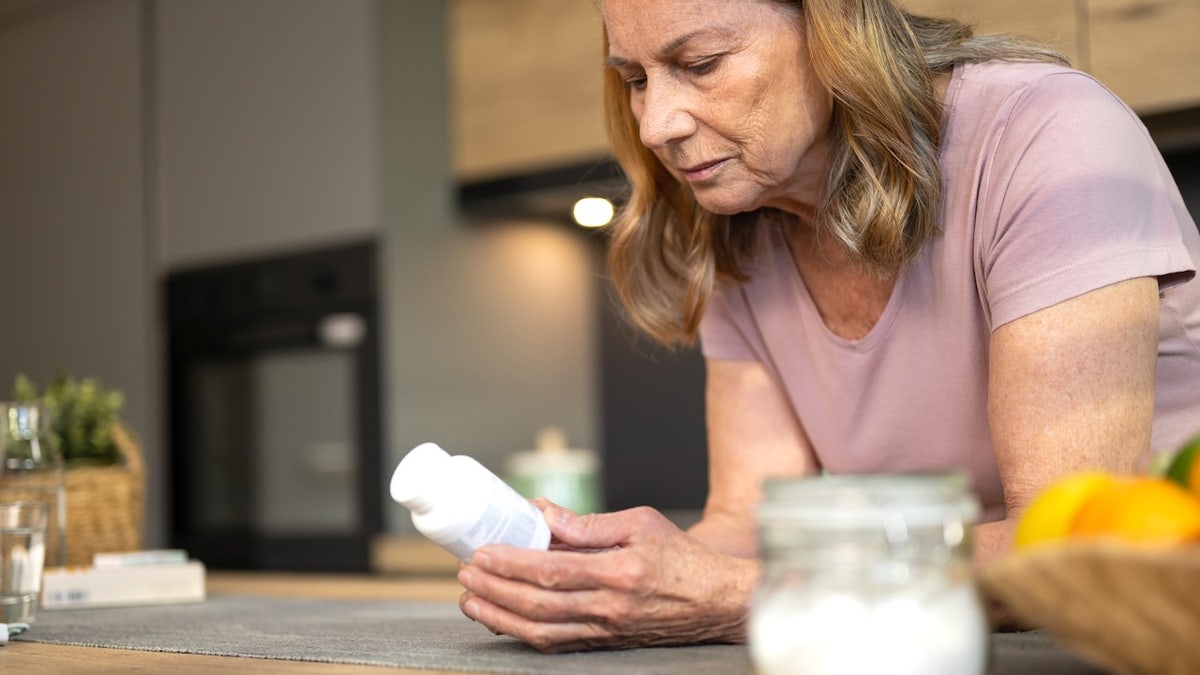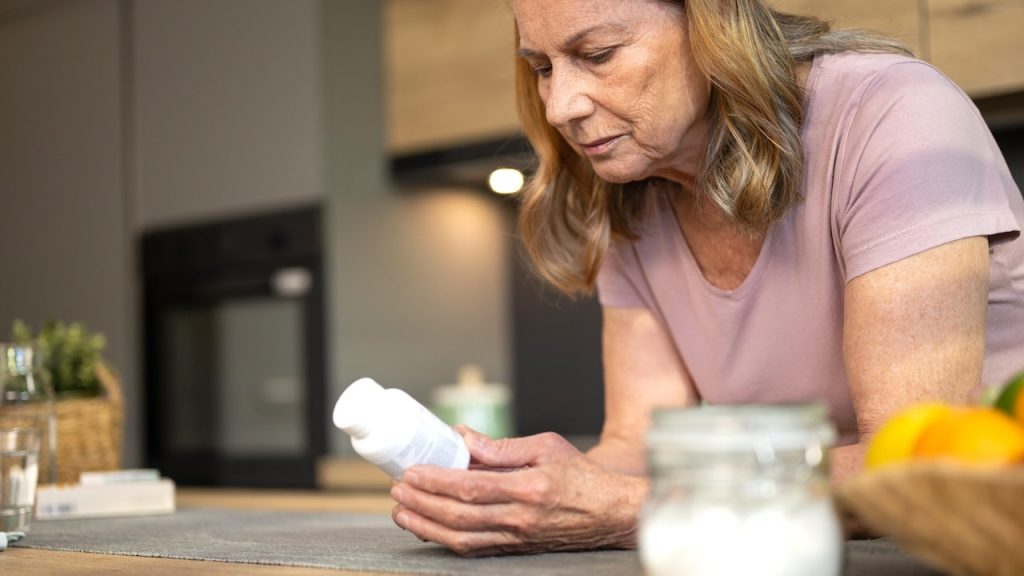NEWYou can now listen to Fox News articles!
Previous research has linked a common vitamin to a slowdown in aging — and now a new Harvard study appears to confirm those findings.
The study, which was published in The American Journal of Clinical Nutrition, found that taking a daily vitamin D pill prevented telomeres from shortening, a hallmark of aging.
Telomeres, which are often compared to the plastic tips on the ends of shoelaces, act as “protective ends” on chromosome strands, according to a Harvard press release.
COMMON DAILY VITAMIN COULD SLOW BIOLOGICAL AGING, MAJOR STUDY SUGGESTS
As people age, telomeres get shorter, which can increase the likelihood of poor health and mortality, prior studies have shown.
Research has also suggested that higher levels of vitamin D in the blood is linked to longer telomeres.

Previous research has linked a common vitamin to a slowdown in aging — and now a new Harvard study appears to confirm those findings. (iStock)
In this latest randomized trial, approximately 1,000 people aged 50 and older were divided into two groups — one group took 2,000 international units (IU) of vitamin D pills each day, and the other group took placebo pills.
After a four-year period, the people taking vitamin D showed less than half of the telomere shortening than the placebo group.
The vitamin D group also had fewer autoimmune diseases and reduced inflammation markers.
COMMON VITAMIN SHOWN TO REDUCE AUTOIMMUNE DISEASE
Lead study author JoAnn Manson, professor of medicine at Harvard Medical School, said the findings “suggest a promising role for vitamin D in slowing a pathway for biological aging and age-related chronic disease.”

Fatty fish, including salmon, sardines and tuna, and wild mushrooms are other sources of vitamin D, an expert said. (iStock)
While the researchers were surprised that vitamin D was linked to such substantial protection against telomere shortening, Manson told Fox News Digital, the findings are consistent with previous evidence.
“Vitamin D tamps down inflammation, a major cause of telomere shortening and chronic diseases of aging,” she said.
Vitamin D recommendations
The question of what constitutes an “adequate” blood level of vitamin D is a “controversial topic,” according to Manson.
In the study, the team found that 2000 IU per day was “very safe,” without side effects or adverse events.
TO STAY HEALTHY, EAT MORE FOODS WITH VITAMIN D, NUTRITION EXPERT ADVISES
“Blood levels for deficiency and recommended blood levels vary across organizations, labs and countries, which is one of the reasons for doubt about the test’s usefulness,” Manson said.
The U.S. Preventive Services Task Force and most professional societies in the U.S. do not recommend universal screening for vitamin D blood levels or routine use of vitamin D supplements, the researcher pointed out.
“Vitamin D tamps down inflammation, a major cause of telomere shortening and chronic diseases of aging.”
“The National Academy of Medicine recommends 600 IU of vitamin D per day for adults up to age 70 and 800 IU above age 70, stating that these intakes will meet the requirements of the large majority of adults in the population,” she said.
“However, recent guidelines from the Endocrine Society suggest that vitamin D supplements may be helpful for adults aged 75 and older, infants and children, pregnant women, and those with a diagnosis of prediabetes, but they don’t specify a specific dose.”

In the study, the team found that 2000 IU per day was “very safe,” without side effects or adverse events. (iStock)
For anyone who has concerns about getting adequate vitamin D from their diet and/or time outdoors, Manson said that supplementation with 1000 to 2000 IU/day of vitamin D would be “very reasonable.”
“In the U.S., foods such as dairy products, cereal and orange juice are often fortified with vitamin D, so checking nutrition labels can help you make better decisions about which foods to purchase,” she advised.
“Fatty fish, such as salmon, sardines and tuna, and wild mushrooms are other sources.”
CLICK HERE TO GET THE FOX NEWS APP
Groups at high risk for vitamin D deficiency include those living in nursing homes, people with malabsorption conditions like Crohn’s or celiac disease, those being treated for osteoporosis or other bone health problems, and those with major dietary restrictions, such as severe lactose intolerance, according to Manson.
“[People in these groups] should talk with their doctors about being tested for vitamin D blood levels and taking a vitamin D supplement,” she recommended.

Groups at high risk for vitamin D deficiency include those living in nursing homes, people with malabsorption conditions like Crohn’s or celiac disease, and those being treated for osteoporosis or other bone health problems. (iStock)
The doctor noted that people need only small to moderate amounts of vitamin D for good health, as the vitamin’s metabolism is “tightly regulated” in the body.
“More is not necessarily better, and very high doses — such as more than 10,000 IU/d — may be associated with high blood or urine calcium levels and toxicity,” she cautioned.
CLICK HERE TO SIGN UP FOR OUR HEALTH NEWSLETTER
Manson emphasized that taking a supplement is not a substitute for a nutritious diet and healthy lifestyle.
“Although it’s much easier to pop a pill than to be physically active outdoors and eat healthfully, these lifestyle factors will do more to keep you healthy and lower your risk of cardiovascular disease, cancer, type 2 diabetes and other chronic diseases of aging,” she said.
“More is not necessarily better.”
Going out for a 15-minute walk a few times a week at midday will typically provide enough sunlight exposure for the skin to synthesize vitamin D, Manson added.
“Even more important for your health would be to exercise outdoors, such as brisk walking, jogging or playing sports.”
Looking ahead to future research
“Although the results are exciting, we believe that replication of these results in a separate randomized trial will be important before changing general guidelines for vitamin D intake,” said Manson.
For more Health articles, visit www.foxnews.com/health
The study was supported in part by the National Heart, Lung, and Blood Institute, the National Cancer Institute and the National Center for Complementary and Integrative Health.

